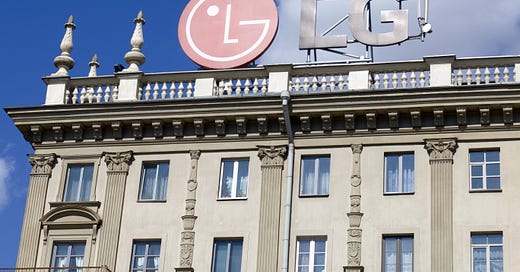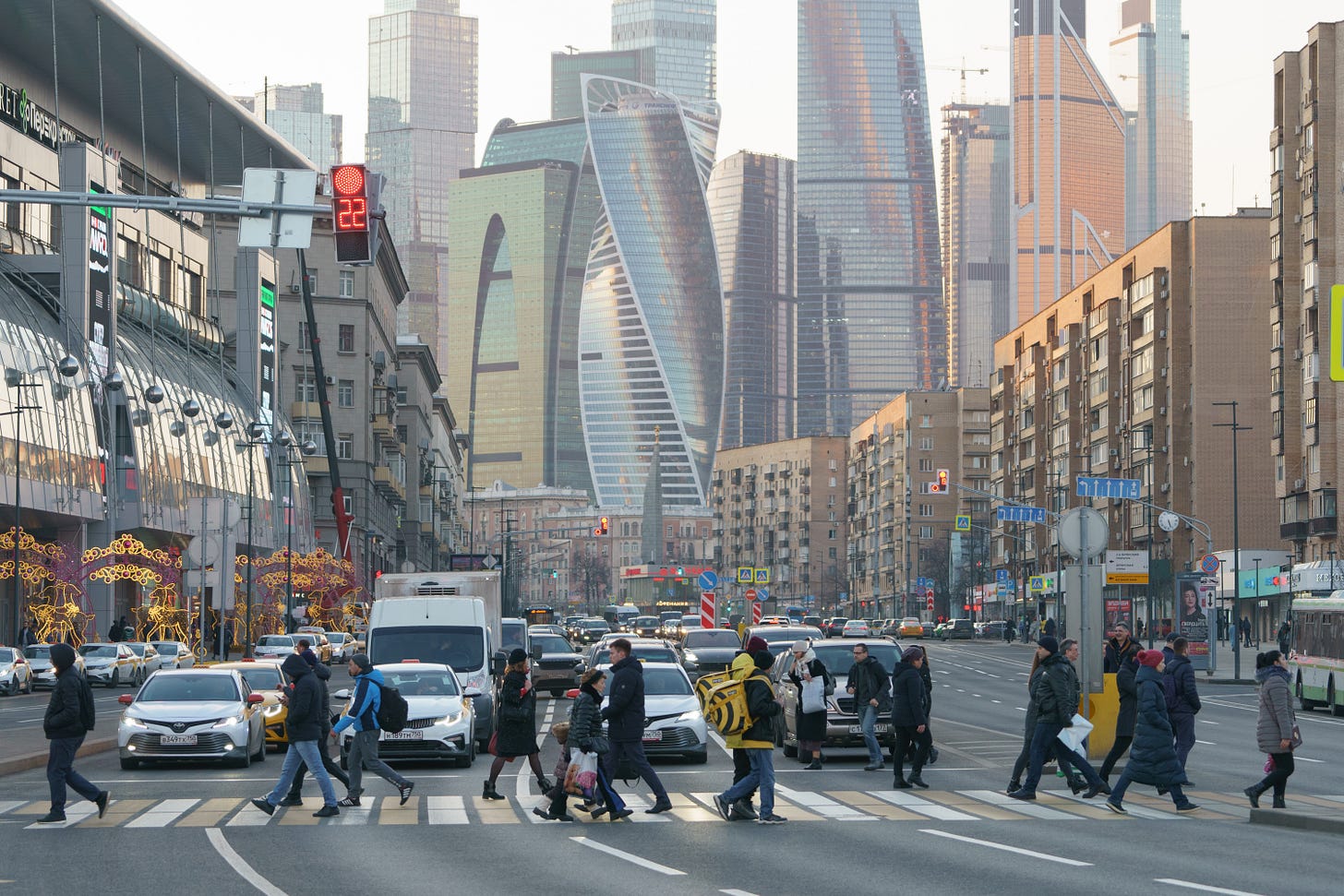Emerging Markets Daily - January 27
LG Energy Surges on S. Korea Debut, Emerging Europe to Slow in '22, Asia Stocks Hit Bear Territory, Commodity Prices and Energy Transition, Philippines Economy Rising
The Top 5 Stories Shaping Emerging Markets from Global Media - January 27
Tesla Battery Maker LG Energy Solution Surges on South Korea Debut
“The strong debut made LGES, which supplies Tesla, General Motors and Volkswagen, South Korea’s second-largest stock after Samsung Electronics. The IPO, the world’s biggest deal this year, attracted bids from institutional investors worth $13tn this month.”
Financial Times
“Shares of LG Energy Solution surged on its market debut, propelling the electric battery maker to become South Korea’s second-most valuable company after raising Won12.8tn ($10.6bn) in the country’s biggest initial public offering.”
“The shares opened up 99 per cent at Won597,000 on the IPO price as investors rushed to capture a piece of the global electric vehicle industry. The stock closed 15 per cent lower at Won505,000.”
“The strong debut made LGES, which supplies Tesla, General Motors and Volkswagen, South Korea’s second-largest stock after Samsung Electronics. The IPO, the world’s biggest deal this year, attracted bids from institutional investors worth $13tn this month.”
“But the company’s market capitalisation of Won108.6tn ($90bn) is dwarfed by the more than $200bn value of industry leader Contemporary Amperex Technology. LGES plans to use the IPO proceeds to triple its production capacity by 2025 to meet growing demand for electric vehicle batteries and take on its bigger Chinese rival.”
“Analysts were upbeat about LGES’s business prospects. Electric vehicle sales are forecast to account for almost a third of all new vehicles by 2030, according to Deloitte. LGES controls about 20 per cent of the global electric vehicle battery market against CATL’s 32 per cent, reported SNE Research.” Song Jung-a reports.
Eastern and Central Europe Growth to Slow In 2022-23
Bne Intellinews
“The Vienna Institute explained the expected 2.5 percentage point slowdown in growth this year on the performance of the region’s biggest economies, Russia and Turkey.”
“The Vienna Institute for International Economic Studies (wiiw) has hiked its 2021 CEE growth forecast but lowered its predictions for 2022 and 2023 as the region’s economies slow down amid the withdrawal of COVID-19 pandemic aid.”
“In its winter forecast released on January 26, the wiiw raised its 2021 forecast of average growth in the region from the 5.4% forecast in October to 5.7%, but has lowered this year’s forecasts from 3.7% to 3.2%. The 2023 forecast is cut to 3.0 from 3.5%, while the wiiw predicts 3.1% growth in 2024. The institute names inflation, the Ukraine crisis and COVID-19 as posing downside risks.”
“The Vienna Institute explained the expected 2.5 percentage point slowdown in growth this year on the performance of the region’s biggest economies, Russia and Turkey. Turkish growth is expected to slow to 3.5% this year, from a forecast 9.5% in 2022, as the country’s economic boom collapses, bringing with it a sharp depreciation in the lira and soaring inflation.”
“For Russia, GDP growth is forecast to slow to 2% this year from 4.5% last year, and to decline further to 1.5% in 2023, all on the assumption that tougher sanctions will be imposed over the Kremlin’s sabre rattling in the crisis over Ukraine.”
“The wiiw noted, however, that Russia’s resilience to sanctions had improved. “The scope for forcing Russia to change its behaviour over Ukraine using economic sanctions is limited, pointed out Richard Grieveson, deputy director of wiiw.”
“The wiiw says high inflation is the biggest risk to economic recovery in the CESEE region – ranking ahead of both the conflict with Russia and the COVID-19 pandemic. After 8.7% inflation last year, it expects a weighted average of 10.3% in CESEE this year – and in Turkey as much as 26.2%. However, the inflation rate in the Visegrád countries of Poland, Czechia, Slovakia and Hungary should average 5.2%.” Bne Intellinews reports.
Asian Stocks Tumble into Bear Market Territory as Fed Rate Hikes Loom
Bloomberg
“Weeks of fretting over the Federal Reserve’s plan to combat inflation with higher interest rates is coming to fruition as Asian stock markets tumble into bear markets and technical corrections.”
“The MSCI Asia Pacific Index slid as much as 2.7% Thursday, pushing it down more than 17% from its recent high, after Fed Chair Jerome Powell signaled a March lift-off for interest rates. South Korea’s tech-heavy Kospi extended its drop since a July peak to 21%, entering a bear market, as investors dumped growth stocks amid rising yields. China’s CSI 300 Index also slipped into bear territory.”
“The intensifying selloff has put Asia’s stock benchmark on track for its worst monthly loss since March 2020. That’s after it trailed the MSCI AC World Index by 20 percentage points last year.
“Technology names from Alibaba Group Holding Ltd. to Sony Group Corp. were the biggest drags on the MSCI Asia gauge Thursday as rising bond yields continue to hammer growth stocks, whose values are based on future prospects. In Hong Kong, the Hang Seng Tech Index plunged 3.8%.”
“Even as it approached the grim bear-market milestone, China’s benchmark CSI 300 Index fared better than the regional benchmark as it was down 2% on the day. Global brokerages have turned increasingly bullish on the nation’s equities as the People’s Bank of China eases policy, diverging from the Fed.” Min Jeong Lee reports.
Commodity Price Volatility Adds Uncertainty to Global Energy Transition
The National
“Volatile commodity prices, fragmented economic growth and fragile geopolitics stemming from increased energy interdependence have emerged as top concerns that will add to the uncertainty of achieving the global energy agenda, according to the World Energy Council.”
“The volatility in hydrocarbon prices were the biggest critical concern across almost all regions in 2021, a 12 times increase from 2020, the World Energy Council said in its annual World Energy Issues Monitor on Thursday.”
“Record price increases in natural gas, driven by shortages and supply bottlenecks, particularly in the UK and Europe, have contributed to the climate of uncertainty. Northern European and Asian gas markets are also similarly affected.”
“Wild swings in oil prices also ‘speak for themselves’, said the report, which surveyed 2,200 energy industry executives and government and civil society leaders from 108 countries, said.”
“…The geopolitics of energy also scored high in the latest report. This higher impact score reflects the perceptions of big energy players such as the US, China and Russia.” Sarmad Khan reports.
Philippine Economy Beat 4Q Forecasts, Gov’t Sees 2022 Acceleration
Channel News Asia
“The Philippine economy expanded faster than expected in the fourth quarter of 2021, buoyed by robust consumer spending, with the government optimistic that growth will accelerate this year despite a resurgence in coronavirus cases and inflation risks.”
“The Southeast Asian country's gross domestic product rose 7.7 per cent in the December quarter from a year earlier, faster than a downwardly revised 6.9 per cent expansion in the previous quarter, and beating a 6.0 per cent forecast in a Reuters poll.”
“That took full-year GDP growth to 5.6 per cent, exceeding the government's 5.0 per cent to 5.5 per cent target and marking a sharp rebound from a record 9.6 per cent contraction in 2020 amid prolonged COVID-19 lockdowns.”
“The economy grew 3.1 per cent in the December quarter from the preceding three months…The Philippines is aiming to achieve GDP growth rates of 7.0 per cent to 9.0 per cent for 2022 and 6.0 per cent to 7.0 per cent for both 2023 and 2024, banking on an accelerated vaccination drive to allow the economy to reopen further.”
“The Philippine central bank, which has kept its key rate at a record low of 2.0 per cent since November 2020, has vowed to prioritise an economic recovery, suggesting it will not raise interest rates anytime soon.” Channel News Asia reports.
“It isn't where you came from. It's where you're going that counts.” - Ella Fitzgerald






